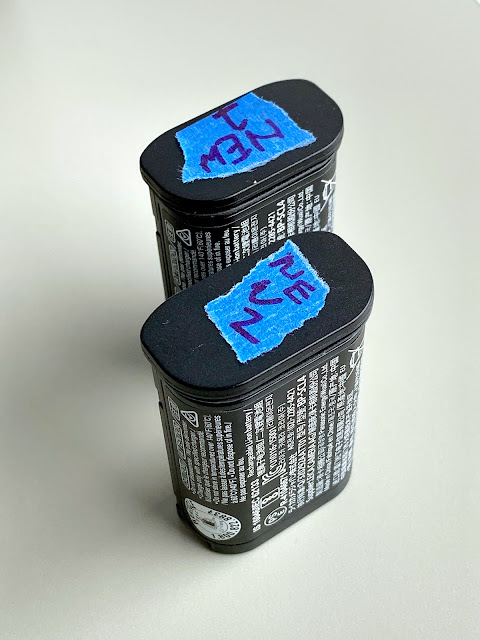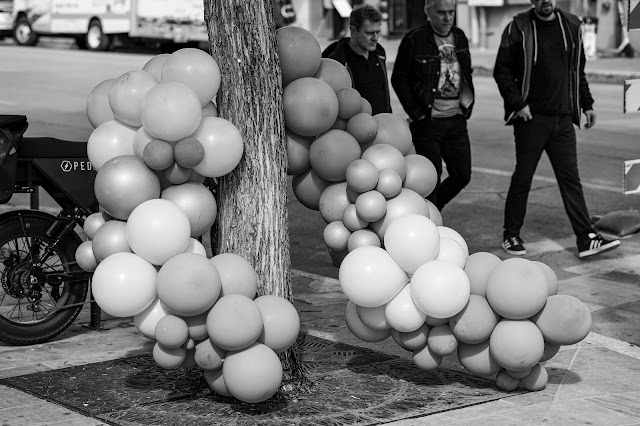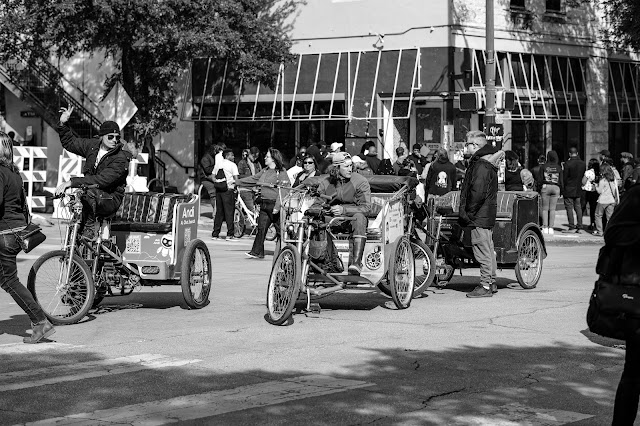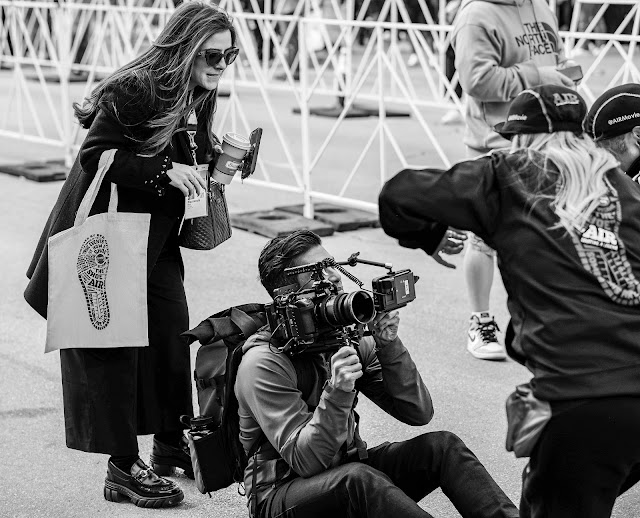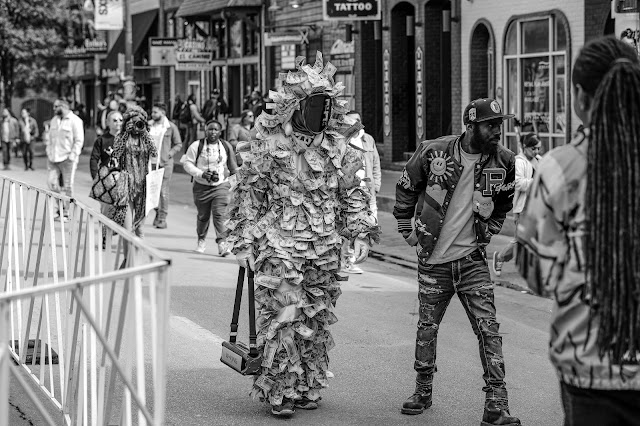I felt a certain sense of calmness when I pushed away from the keyboard and monitor yesterday. I put on comfortable shoes. I walked. I looked at stuff at a distance. I drank a nice coffee at Mañana. I had a decent croissant as well. And as I was sitting at a café table watching the sun go down and feeling the wind pick up I did an inventory of the day.
3.22.2023
Taking my own advice and stepping away from the internet for the day. With a camera over one shoulder.
I felt a certain sense of calmness when I pushed away from the keyboard and monitor yesterday. I put on comfortable shoes. I walked. I looked at stuff at a distance. I drank a nice coffee at Mañana. I had a decent croissant as well. And as I was sitting at a café table watching the sun go down and feeling the wind pick up I did an inventory of the day.
Does the endless availability of information (and subsequent addiction to gaining "knowledge") actually "kill" the process of enjoying photography?
The imminent disappearance of Digital Photography Review (DPR) has been rattling around in my brain since I read about it yesterday. In the moment I wrote about what I thought the effect of this deletion would mean financially, both for camera companies and also the many thousands of bloggers and v-loggers that depend on the residual effects of freely and widely promoting so much gear with so much online content. And content delivered with so much detail.
The site itself is like a clearing house for comments, opinions and other ruminations from photographers all over the world. But at its essential core it's a commercial site that uses the promotion of material desire to profit, and to do so requires that the content be made as "sticky" as possible. The goal is to keep a visitor engaged as deeply and for as long as is possible. The hope is that some percentage of the millions of visitors will click on the ads and links and that will end up resulting in sales. Rants, brand tribalism and differences of opinion are part of that sticky glue that keeps people coming back.
One thing I've found out over the course of my life is the "need" of many, many people to exhaustively research everything they do. Everything they buy and everything they use in their own processes. Consciously or unconsciously the people who have been engineering content on Amazon's DPR site have understood that set of needs for well over a decade which is why the news feed about the industry is constant and the reviews are done only, mostly, for the more popular camera types and brands. The ones most likely to sell well. The content helps to fulfill the audience's need to sit in front of computers, phones, iPads, etc. and "research, research, research."
In some ways this could be a result of the demographics of serious, potential camera buyers. Since high end cameras could be considered luxury goods which are far better than what is needed for most photographic engagements (or real world photo work) and since a huge percentage of the people in the world can not conceivably afford to buy them it seems obvious to me that most buyers came through a college education and entered a professional workplace. The education and even the protocols of "information technology" work require doing research. Research sounds good. Research drives innovation (sometimes) while less financially rewarding work is much more codified and routine. Not requiring the proclivity for deep research.
While most people who buy expensive cameras (meaning, in this context now, any camera that's more capable and more expensive than a smart phone) start with the plan to spend much time out shooting photographs I suspect that the most avid camera consumers, because of their education and corporate training, are actually more compelled to use any camera purchase as the starting point to begin researching (avidly and with little concern for efficiency of time) their next step up in the hierarchy of cameras. The vaunted "upgrade path." And this need for research and "advancement" is exactly what sites like DPR have long provided, enabled, goaded and manipulated.
If the only goal of a photographer is to make a good photograph we could have decided never to have embraced digital imaging and we'd still be able to make great pictures with film cameras. If we'd copied the process we used for buying film cameras, replacing camera bodies maybe every five to seven years (or more) the sites would have had so much less power over us. Less compelling reasons to park on a site for the purpose of "urgent" research. Less time spent seated and scrolling.
I think it was well known that we all could have stopped buying "up" the digital camera chain at any time past 2010 and realized just as good photographs as we get from current gear except in the most obscure and specialized fields. And having stopped our research, reading and forum disputes we would have had much more time to walk through the streets, forests, cities and the landscape of human relationships and make photographs that would have been superior because our time would have been spent researching the subjects and relationships of ourselves to our passions instead of making images to "prove beyond a shadow of a doubt that camera XXX had 00.15% more dynamic range than camera YYY."
We talk about the idea that these big sites help us build community but from an overview perspective I think the readily available "bait" and the "promise of superior technical results" pushed us away from actual hands on experience and actual community to a much bigger degree than we think. We spent less time, not more, with other people. Less time engaged in face-to-face conversations. Less time photographing subjects because we like them and not just photographing random stuff to show off the wide open edge definition of some new lens offering some insanely fast aperture.
We basically, as an online community, imprisoned ourselves in little clusters in the forums to either argue about the buying decisions we made or were going to make, or to argue endlessly about minutiae that has little relevance to our real lives. Or to our photography.
I'm certainly not immune to the whole idea of researching cameras and lenses and I've spent too much time over the years reading it on so many different sites. But I think I know the solution. It's as easy as turning off the computers and phones, picking up a camera that you enjoy using, and heading out the door to make photographs of subjects that you, personally, find to be interesting.
The next step is to engage, in person, with people who share your interests in photography. Meet for coffee. Meet for walks. Push each other into fun projects. Help knock down the barriers to actually engaging in the non-virtual pursuit of photographs and fun instead of becoming an endless internet voyeur of gear buying. Or worse, a continuous gear researcher.
In the end who really cares if your miracle lens resolves a few more veins on leaves at the very edge of a frame? And who in the world would willingly spend minutes, hours and days trying to prove or disprove "equivalence?"
Perhaps it takes the death of a historic site to get people out of their seats and on to their feet with a camera in their hand, a plan in their head, and the joyful anticipation of what awaits them as they step across the threshold of their homes and into the real world around them.
Sometimes I go hours without drinking coffee. It's called sleeping.
3.21.2023
Digital Photography Review, the Universe's biggest camera review site and online photographer community, just announced that they are closing shop on the 10th of April. Sad News. (DP Review).
My discovery of DP Review happened back around the turn of the century when there were far, far fewer equipment review sites and the ones that were out there were variable in quality. I think it was a guy named Phil Askey that started the whole thing back in 1999. But his reviews were just great and he really was running a one man show, more or less.
The site was based in London and the writing was always great back then. And the understanding of photography (as opposed to mumbly faux physics of recent times) was deep and both technically and aesthetically well grounded. Professionals turning from film to digital depended on the site to parse out the best new digital camera gear and to learn best practices. It was the anchor for camera knowledge in the early years of digital adaptation.
Amazon bought the site in 2007, moved DPR's HQ to Seattle and watched it grow during the lead up to the peak year of digital embrace (and sales) back in 2010 or, depending on how you measure, 2011. After that sales of interchangeable lens cameras and their lenses dropped in quantity year by year. But as the reviews declined a bit in quality and scope (compared to Phil's stuff) the enthusiasm for the site's ability to build community (forums) and become a home for various rants and hot user competitions/debates between brands of cameras grew unchecked. As did eyeballs on the content.
Even in current times I'll go and read a camera review of some model that's interesting to me. And being both the biggest photo gear oriented site on the web and the one connected at the hip to the world's biggest online retailer (Amazon: which, of course, sold cameras, lenses, accessories, etc.) the editorial staff of DPR got the first crack at the latest test gear, the latest beta gear and the latest gear, gear. So, readers got a heads up about new cameras as soon as humanly possible. Barring NDAs. What a privileged position to be in.
While I was put off by the endless bad information in the fora, and the rage that ensued and continued almost endlessly, I did find the industry press releases they published and the camera tests the new crew tried to put out still readable and sometimes informative. They lost me for a while with all the sturm und drang over "equivalence" but after a guy named Rishi left all that died down and became floor fluff. Background noise. Rant fuel.
While I will miss the site I think the effect on the world of photography will be much more profound. Think of this: Millions and millions of viewers every month came to the site to learn about new cameras, new lenses and new accessories. Most of these products were introduced via editorials which meant that the manufacturers were getting direct access to the world's biggest market for upscale cameras at no cost to them. Well, other than sending along some cheap swag and some review cameras. Even the camera reviews (unpaid by camera makers) were amazing free marketing for the camera industry in general. By closing the site Amazon will be removing from Nikon, Sony, Canon and even Leica millions and millions of direct connections to potential (and proven) buyers of their goods. I predict that without DPRs crew priming the pumps and waving the flags of "new innovations" we'll see a noticeable-to-huge decline in camera and lens sales world wide. And none of the camera makers will want to step up their advertising placement budgets by millions and millions of dollars to replace the lost (free and global) reach. They've been attached to the free nipple of promotion for so long they may not even know how to effectively generate demand through other media.
The ripple effects will be endless. Without DP Reviews reviews of new top-of-the-line cameras and the implied approval provided by those reviews people who still hear about the new gear might be more hesitant to buy. It's different buying an item that's largely unvetted versus buying a product that's been vouched for by a long running and mostly respected review site. No one wants to be bit from being and early adopter.
As camera makers' reach dangerously erodes so too will sales at local and regional merchants who also depend on DPR to trumpet new product arrivals. Many of these smaller stores exist precariously as it is. This may be the event that pushes many of them into insolvency...
And if my blog were a source of income I'd be leaping into action to come up with something to replace affiliate profit sharing because a decline in (free) world wide advertising and product awareness will definitely bring down sales and by extension affiliate cash, which represents a big part of site revenues.
You may say that this will be temporary, just a bump in the road. And if sales had been hopping along well for the industry for the past ten years I might optimistically agree but you have to understand that the overall market for cameras (not phones...) has been in a yearly free fall since about 2013. Ten years of annually declining sales already.
What was (is?) your experience with DPR? What do you think their closing will cause? Have I missed some mitigating facet that might actually benefit the industry?
The funny thing is that this might just bolster the commercial market for actual photography. I'll have to think on that a while before I write more.
Just thought I'd let you guys know.
First black and white film scan with the new copy stand.
I set up a little semi-permanent copy stand/film copier set up in one corner of the office. I'm starting to "scan" medium format, black and white film from the past.This image is my first try. It's a photo I took with a 6x6 cm camera onto Tri-X film many, many years ago. The subject is "Lou" and the location is the gardens at Laguna Gloria Museum.
The whole set up is quite simple. I bought a small but well made copy stand, attached a Sigma fp camera fitted out with a Sigma 70mm f2.8 macro lens (Art Series). The lens was set at f5.6 and I let the camera select the shutter speed via A priority. Then I used the exposure compensation control to get the tones I wanted. Set the camera to shoot DNG files and to have a 2 second self-timer.
When I brought the file into Photoshop I merely clicked on "invert" in the adjustments menu and I was presented with a flat but pretty well detailed image file. I opened levels and used the black eyedropper tool to sample the space between frames (which should print black if you were doing this in a conventional dark room) and then adjusted the highlight and mid-tones to taste.
Because it's film I did have to spot out a few dust spots with the little "band-aide" icon. I sharpened the parts of the frame that I thought needed it, letting the photo spirits guide me. And then, with the click of a button, the photograph appeared on my desktop. Time elapsed? About five minutes. I think it's not bad for a first try. Might need to find a sharper negative though. I think I just missed getting the focus on her face...
Sobering epiphany strikes Kirk while undertaking new duties.
3.20.2023
Business note. First gear purchase of 2023. Utilitarian. But helpful.







